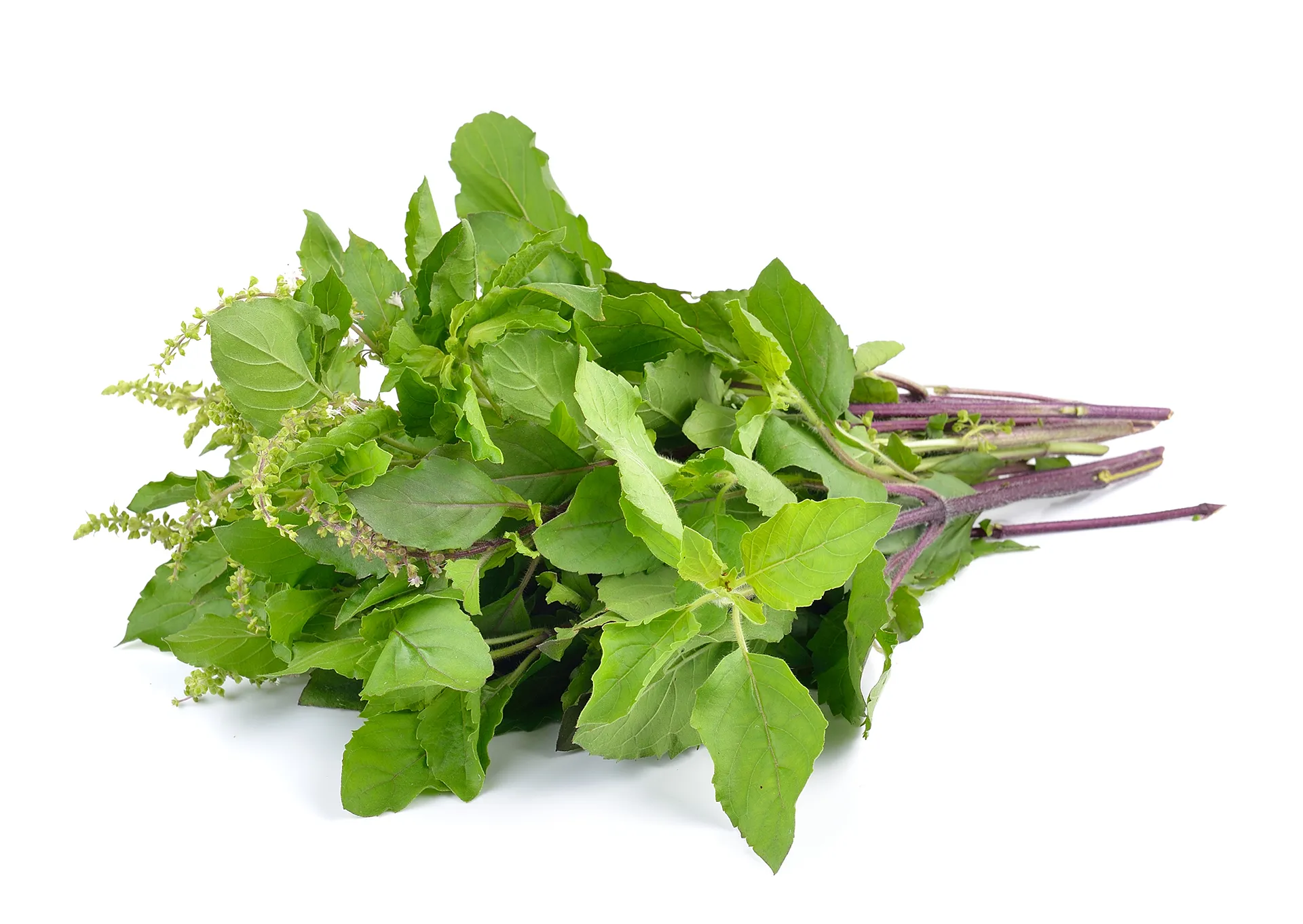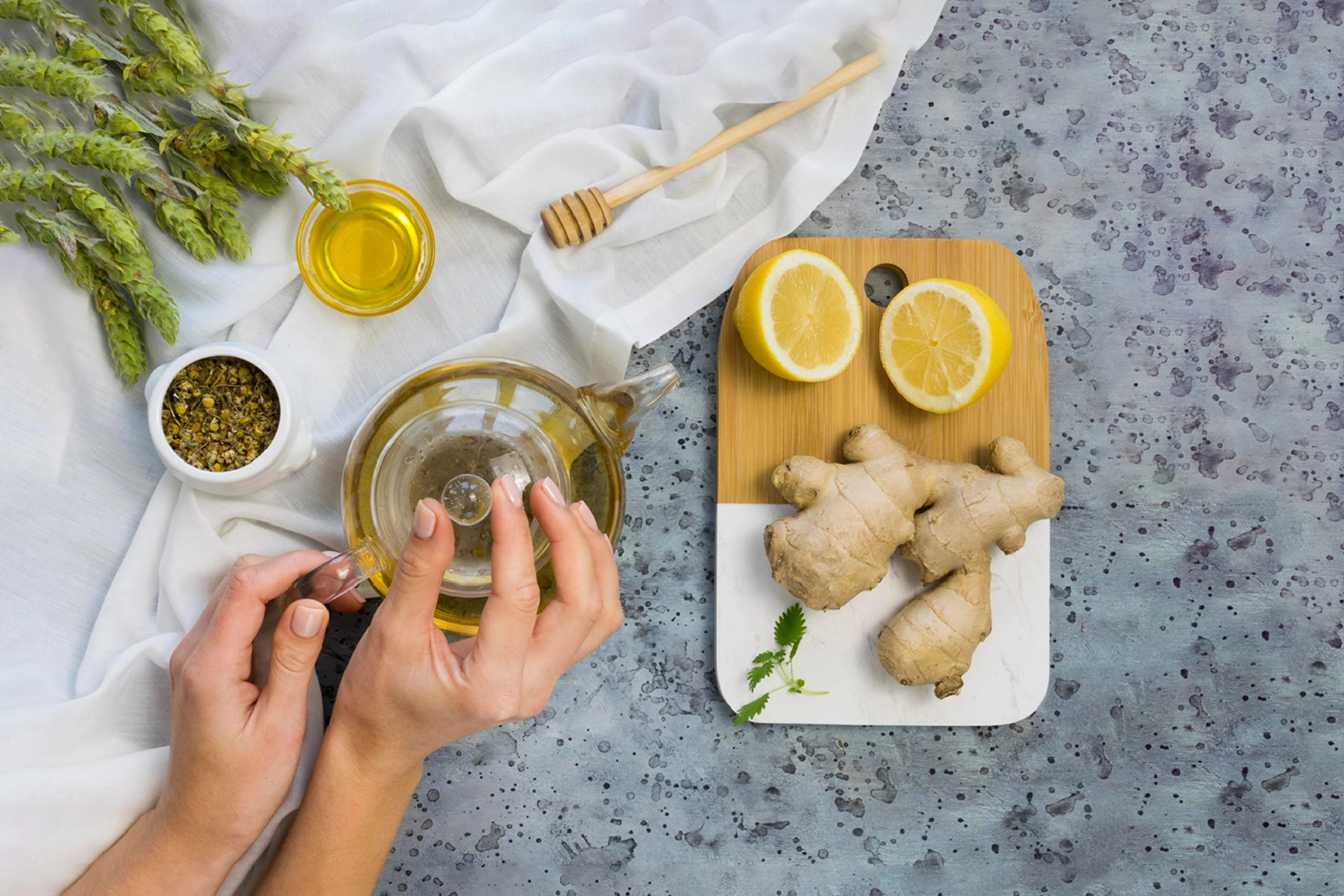Ayurveda | 10 min read
Tulsi Benefits, Nutritional Value, Dosage, Precautions
Medically reviewed by
Table of Content
Key Takeaways
- Tulsi has adaptogenic, antimicrobial, and anti-inflammatory properties
- The detoxifying and diuretic benefits of holy basil treats kidney stones
- Tulsi acts as an ayurvedic treatment for migraine pain and headaches
Tulsi, also known as holy basil, is considered a holy herb in Indian mythology. Regarded as the queen of herbs, tulsi has therapeutic effects on humans [1]. It offers antimicrobial, adaptogenic, anti-inflammatory, and immunomodulatory benefits [2]. The herb has been in use for treating illnesses for over 5,000 years and has three varieties in India - Krishna Tulsi, Rama Tulsi, and Vana Tulsi [3].
The tulsi herb hails from the family of mints and is rich in antioxidants and nutrients. It is mainly used in the treatment of respiratory, digestive, and skin diseases. It offers a host of other health benefits too. Read on to know about different tulsi benefits for health.
Nutritional Value of Tulsi
Tulsi leaves are high in vitamins A, C, and K, as well as minerals such as calcium, magnesium, phosphorus, iron, and potassium. It also contains a healthy quantity of fiber and protein. Here is a detailed nutritional breakdown for 100g of Tulsi (also known as basil). It should be noted that you will ingest far less Tulsi when consumed as a herb.
Per 100g serving amount | Percentage of the daily intake necessary | |
Calories | 22 | |
Fats total | 0.6 grams | 0 % |
| Saturated Fats | 0 grams | 0 % |
Cholesterol | 0 grams | 0 % |
Carbohydrates totally | 2.7 grams | |
Fiber | 1.6 grams | 6 % |
Sugars | 0.3 grams |
Remember that dried (or powdered) Tulsi leaves may provide somewhat higher percentages of the aforementioned nutrients than fresh Tulsi leaves do.
Tulsi Benefits
The tulsi benefits are as follows:
Immunity Booster:
Tulsi is a natural immunity booster since it is high in zinc and vitamin C. As a result, it enhances natural immunity and helps to keep infections at bay. It has potent antiviral, antifungal, and antibacterial properties that protect humans from a variety of illnesses. Tulsi leaf extract boosts the immune system by increasing the activity of T-helper cells and killer cells.
Fever (antipyretic) and Pain (analgesic) Reduction:
Tulsi possesses antibacterial and antiviral characteristics that aid in the prevention of infections and lower fever. Periodic fevers can be treated with black pepper powder and fresh Tulsi juice, and there are a lot of benefits of drinking tulsi water in the morning. Another way to decrease a fever is to boil tulsi leaves in half a liter of water with powdered cardamom (elaichi), then blend the concoction with sugar and milk.
Reduces Cold, Cough, and Other Respiratory Disorders:
The components of Tulsi that aid with cold and chest congestion are camphene, cineole, and eugenol. Bronchitis, asthma, influenza, cough, and cold can all be treated with Tulsi leaf juice blended with honey and ginger. There are a lot of tulsi health benefits that result in reducing all the disorders.
Lowers Stress and Decreases Blood Pressure:
Ocimumosides A and B are present in tulsi, which helps to lower stress and blood pressure. These substances balance the brain's serotonin and dopamine neurotransmitters while reducing stress. Tulsi's anti-inflammatory properties help to reduce blood pressure and irritation.
Anti-cancer qualities:
The phytochemicals in tulsi are potent antioxidants. As a result, they contribute to the prevention of lung, skin, liver, and oral cancers.
Beneficial for Heart Health:
Tulsi lowers blood cholesterol levels, inhibits ischemia and stroke, lowers blood pressure, and has higher antioxidant qualities, all of which have a significant impact on the care and management of cardiovascular illnesses.
Tulsi Benefits for Skin
Tulsi acts as an ayurvedic treatment for acne and other skin issues. The herb has antioxidants like vitamin A and C and phytonutrients that protect you from free radical damage. It helps fight infection and prevents skin-related disorders. It can stop premature aging as its leaves help unclog the pores and hydrate your skin. The leaves can remove toxins, cleanse your face, and contribute to your glowing skin. The anti-microbial properties of the holy basil leaves can make your skin look younger!
Additional Read: Ayurvedic Remedies for Acne
Tulsi Benefits for Cough
Tulsi can help you get relief from cold and cough. The compounds in tulsi such as camphene, eugenol, and cineole can reduce congestion in your chest. It also protects you from various viral, bacterial, and fungal infections. Consume tulsi leaves to cure respiratory disorders such as asthma, bronchitis, tuberculosis, and influenza.
Tulsi Benefits for Headaches
You can use tulsi as an ayurvedic treatment for migraine pain. The medicinal properties of tulsi make it a natural headache reliever. For this benefit, the herb has been in use for centuries. Consume it by boiling the leaves or adding the herbal powder to smoothies and meals.
Tulsi Benefits for Kidney
Tulsi is a detoxifying agent and has mild diuretic properties. It helps lower the level of uric acid in your body. Uric acid is the main cause of forming kidney stones. Thus, consuming tulsi may help prevent kidney stones by reducing uric acid levels. Besides, the acetic acid found in holy basil treats kidney stones by helping them break down. Reducing uric acid also helps people suffering from gout.
Tulsi Benefits for Relieving Stress
Tulsi is an adaptogen and has antioxidants that lower your cortisol levels, thus helping relieve stress. The mental health benefits of tulsi include relieving fatigue and improving concentration. It contains compounds that balance the serotonin and dopamine levels in your brain. Further, the anti-inflammatory properties of tulsi reduce inflammation in your body. Thus, with the help of tulsi, you can lower your psychological, physiological, metabolic, and chemical stress.

Tulsi Benefits for Oral Health
Tulsi is used in preparing herbal toothpaste due to its teeth and gum strengthening properties. It can kill bacteria that cause dental cavities, plaque, and bad breath. The herb acts as a natural mouth freshener and an oral disinfectant. Tulsi helps manage oral health and also cures mouth ulcers. The antibacterial properties in tulsi leaves are effective in removing and preventing oral plaque without any side effects.
Tulsi Benefits for Heart
Tulsi can be used to treat and prevent cardiovascular diseases. It can lower blood lipids and reduce high blood pressure. The antioxidants and vitamin C content in holy basil can lower cholesterol levels and prevent your heart from the effects of free radicals. If you have hypertension or cholesterol, consume tulsi as it prevents blood clots from forming in the arteries. Tulsi leaves can also remove plaque build-up by dilating and contracting your blood vessels. Thus, it helps prevent atherosclerosis and coronary heart disease.
Tulsi Benefits for the Immune System
Holy basil is a natural immunity booster that helps protect you against infections due to its rich vitamin C and zinc content. The herb offers anti-bacterial, anti-viral, and anti-fungal benefits to help keep diseases and infections at bay. A weak immune system can make you prone to respiratory infections including cold and flu. Tulsi leaves are said to increase the activity of T helper cells and natural killer cells, thus strengthening your immunity. You can prepare kadha for immunity by adding tulsi leaves to it.
Tulsi Uses
The following are some of the uses of tulsi leaves- Tulsi has an antibacterial quality that relieves cold symptoms. It is well recognized to strengthen the immune system and ward against various illnesses. It reduces acidity by preserving the pH equilibrium in the stomach. Tulsi contains several phytochemicals that have also been linked to cancer prevention. Because it is an antioxidant, it also detoxifies the body.
- You can also use the water from the tulsi leaves. You can drink this water because there are so many benefits of drinking tulsi water in the morning.
- Also, you can make herbal tea with the leaves of the herbal plant tulsi. The tulsi tea benefits are enormous.
Side Effects Of Tulsi Leaves
Has an impact on both male and female fertility
- In a research published in the International Journal of Ayurveda Research in 2010, it was shown that when taken in large numbers, tulsi might reduce sperm motility and count in animals.
- Even though this has still not been demonstrated in humans, it is prudent for guys experiencing infertility to reduce their usage of the plant.
It harms the liver
- Eugenol is a compound found in tulsi. Eugenol can safeguard the liver against toxicity, but too much can impair the liver and cause vomiting, diarrhea, a fast pulse, and convulsions.
- Lowers blood sugar levels
- If a person is already on diabetes medication, chewing tulsi leaves may intensify the impact and lead the level of sugar to drop too low.
Those using blood thinners should avoid it
- The tulsi herb has been linked to blood thinning. Tulsi is a wonderful choice for folks who do not want to use blood thinners.
- Consuming tulsi while taking blood thinners, on the other hand, may have a detrimental influence on a person's health.
- People who take anti-clotting medication should avoid eating basil leaves.
Pregnancy
- Tulsi leaves can have an effect on a pregnant woman's and her unborn child's health. It may potentially result in miscarriage in severe cases. The plant may cause potentially dangerous uterine contractions.
- Tulsi may increase blood flow to the pelvis and uterus, causing contractions. Nonetheless, there is insufficient evidence to support or refute the use of tulsi during pregnancy.
Nausea
- Clinical research found that using tulsi caused transitory mild nausea. The 13-week experiment had few negative outcomes, but this doesn't rule out the risk of long-term adverse effects.
- Nonetheless, the historical history of tulsi usage implies that long-term consequences are rare and that regular consumption may be harmless. Additional study is needed to corroborate this.
How to Consume Tulsi?
Tulsi may be consumed safely in the following ways.
- Tea with Tulsi
- Ghee or honey infused with tulsi
- Tulsi tea
- Water with tulsi
Tulsi leaves can be put straight into tea and consumed on a daily basis. Tulsi tea is preferred due to the numerous health advantages it provides.
Tulsi Dosage
A safe long-term dose of holy basil has yet to be determined. In short-term tests, several doses were employed.
- Anxiety and sadness were alleviated by taking 500 mg of left extracts twice a day
- For 30 days, 300 mg of leaf extract per day alleviated central nervous system diseases
- For six weeks, 400 mg of extract in the morning and 800 mg at night reduced stress symptoms such as sleep and memory issues, extreme tiredness, and sexual dysfunction [1]
Precautions For Tulsi
- During human clinical studies, Tulsi has no negative side effects. However, those who are nursing, pregnant, or attempting to conceive should avoid holy basil
- Tulsi is not known to be safe for newborns, children, pregnant women, or nursing moms. Tulsi, on the other hand, has the potential to impair a woman's capacity to conceive
- Tulsi tea can produce nausea and diarrhea when consumed for the first time or when introduced to the diet, so start with moderate amounts and gradually increase
- Tulsi is particularly good in lowering blood sugar levels. Therefore it should be used with caution, especially if you are on diabetes medication
Have tulsi leaves or herbal tea to gain tulsi benefits. Ayurveda has identified many plants and herbs that act as alternative medicine. For the right advice on ayurvedic medicine and dosage, book an online doctor consultation on Bajaj Finserv Health. Consult with the best AYUSH specialists near you for proper guidance on tulsi benefits for health.
FAQs
Can tulsi be taken daily?
Yes, you can take tulsi daily.
Can we drink tulsi water daily?
Tulsi tea has a calming effect and reduces tension when consumed on a daily basis. Ayurveda considers Tulsi to help reduce asthmatic symptoms due to its capacity to regulate Kapha. Tulsi can also help with ringworm treatment.
Is tulsi harmful to your kidney?
Tulsi is well-known for its kidney-strengthening properties. When combined with honey, the juice of Tulsi leaves aids in the removal of kidney stones through urine.
Who should not use Tulsi?
People with diabetes, hypothyroidism, or who are currently using blood thinners should avoid tulsi. Though it is safe, pregnant women should use caution when using tulsi and should avoid it altogether.
What diseases does tulsi cure?
Tulsi can help with the common cold, flu, temperature, asthma, stress, diabetes, heart disease, malaria, liver illness, diarrhea, and sleeplessness.
How many tulsi leaves can you eat in a day?
It is best to consume 5 to 7 raw fresh tulsi leaves each day, preferably first thing in the morning.
Can I take tulsi before bed?
Yes, You can take tulsi before bed. Drinking tea infused with tulsi leaves will help you in calming your mind and body. This will balance bodily fluids and improve digestive system. You will sleep better and be well rested.
References
- https://www.longdom.org/open-access/tulsi-the-queen-of-medicinal-herbs-60106.html
- https://www.ncbi.nlm.nih.gov/pmc/articles/PMC5376420/
- https://organicindia.nz/what-is-tulsi-2/
- https://www.verywellhealth.com/holy-basil-4766587
Disclaimer
Please note that this article is solely meant for informational purposes and Bajaj Finserv Health Limited (“BFHL”) does not shoulder any responsibility of the views/advice/information expressed/given by the writer/reviewer/originator. This article should not be considered as a substitute for any medical advice, diagnosis or treatment. Always consult with your trusted physician/qualified healthcare professional to evaluate your medical condition. The above article has been reviewed by a qualified doctor and BFHL is not responsible for any damages for any information or services provided by any third party.





